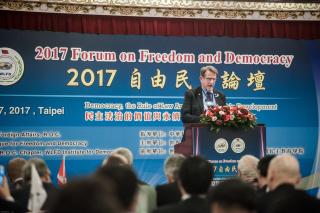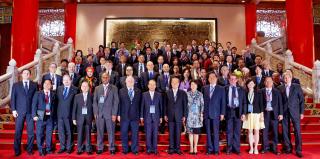First in Asia: Progress towards Marriage Equality in Taiwan
By Bruce Knotts
For the past two years, it has been my honor to chair the NGO/DPI Executive Committee, which represents about 1,500 Non-Governmental Organizations (NGOs) affiliated with the Department of Public Information (DPI) at the United Nations. For many years, the chair of the NGO/DPI Executive Committee has been invited to speak at the annual meeting of the World League of Freedom and Democracy (WLFD) in Taipei, Republic of China (Taiwan). I was invited to speak last year in January 2016 and I was privileged to meet President Ma Ying-jeou and other officials of the government, which was formed by the Kuomintang (KMT) party. In June last year, the Democratic Progressive Party (DPP) won the election and Tsai Ing-wen became the first woman President in China.(1)

Bruce Knotts addresses the 2017 Forum on Freedom and Democracy in Taipei
This year, I was again invited to speak at the annual meeting of the WLFD and to lead a delegation of six members of the NGO/DPI Executive Committee. I opened the conference by highlighting the danger to freedom and democracy posed by current trends towards authoritarian populism, similar to the wave of similar such governments which took power in the 1920s and 1930s, which led to the Second World War. I cautioned the conference to work hard for freedom, democracy, respect for diversity, and inclusion. I also strongly encouraged the Republic of China (Taiwan) to move forward with its plans to enact marriage equality for same-sex couples, as the first nation in Asia to do so and as an example to other nations in Asia.
Later, we met with LGBTQI activists and learned all the twists and turns of the marriage equality debate in Taiwan. The push for marriage equality in Taiwan is part of the move away from dictatorship and towards gender equality. The major opposition to marriage equality comes from the small Christian population of the island (5% of the total population which is mostly Buddhist and Taoist). However, the small Christian population on the island is rich and powerful, especially the Presbyterian Church of Taiwan.
We also went to the DPP ruling party headquarters which was young, progressive, and clearly very LGBTQI-friendly. The DPP made marriage equality part of their electoral platform. However, momentum for marriage equality has been delayed due to the strong opposition from the Presbyterian Church and other Christian groups.

Bruce Knotts (center) along with other members of the NGO/DPI Executive Committee at the 2017 World Forum on Freedom and Democracy in Taipei
We then met the Vice President and made the same points. Vice President Chen Chien-jen responded that the DPP government remained committed to enacting marriage equality, but first, President Tsai Ing-wen charged him to assemble activists and opponents to seek consensus.
Our next stop was exactly that type of meeting. We went to the Legislative Yuan (Congress) and met with members of the Legislative Yuan from both the KMT and DPP parties and with LGBTQI activists and members of the Presbyterian Church of Taiwan. After several impassioned speeches outlining why Taiwan should enact marriage equality, I asked the Presbyterian representatives why they objected to marriage equality and I reminded them that the Presbyterian Church USA endorses marriage equality and ordains LGBTQI clergy. I also mentioned that we Unitarian Universalists, as well as the United Church of Christ and other Christian denominations in the USA recognize marriage equality and the inherent worth and dignity of all people regardless of sexual orientation or gender identity. The Taiwanese Presbyterians said that the American Presbyterians discussed the issue for 40 years before accepting same-sex marriage and that the Taiwan Presbyterians needed more time. I responded that the Taiwanese Presbyterians should take whatever time they needed, but they should not stop the ongoing political process.
Outside our meeting room were six very loud demonstrators protesting our intervention in favor of marriage equality. They wore masks of world leaders: Donald Trump, Vladimir Putin, Theresa May, Angela Merkel, etc. They shouted that Taiwan was not a “guinea pig” to undergo marriage experiments.
The legislators and activists thanked us for our intervention and said that we had helped marriage equality move forward. We left that meeting feeling optimistic, but a week later, the Presbyterian Church in Taiwan held their national general assembly. They asked leaders to stand up and declare whether they supported marriage equality or not. If they did, they were immediately dismissed from their positions, according to a Presbyterian source at the UN.
Despite pushback from the Presbyterian influence, the momentum seems very strong for marriage equality in Taiwan. If it passes, it has the potential to have a strong influence on other Asian nations, particularly Japan, mainland China, Vietnam, and Thailand. It’s not that these nations will immediately move toward marriage equality, but I believe that legal and social impediments to a decent life for LGBTQI people in Asia will likely be reduced and the Asian conversation about sexual orientation/gender identity will move forward.
The Unitarian Universalist United Nations Office (UU-UNO) continues its global advocacy for LGBTQI equality to ever wider circles. Over the past two years, the UU-UNO has focused on Asia as a promising area of the world where we believe progress can be made. We were gratified that Vietnam voted in favor of the UN Independent Expert on Sexual Orientation/Gender Identity issues. Vietnam has also removed all legal sanctions against LGBTQI people. Asian queer activists are on the move and the UU-UNO is there with them in this promising effort.
(1) There are two governments which claim to represent all of China: 1. The People’s Republic of China (PRC) with its capital in Beijing and 2. The Republic of China (ROC) (also known as Taiwan) with its capital in Taipei. This split resulted from the 1949 Chinese civil war. The ROC was generally recognized by United Nations and most nations as the legitimate government of China until 1971, when recognition switched from the ROC to the PRC.

Bruce Knotts (fourth from the right in front row) along with other participants of the 2017 World Forum on Freedom and Democracy in Taipei